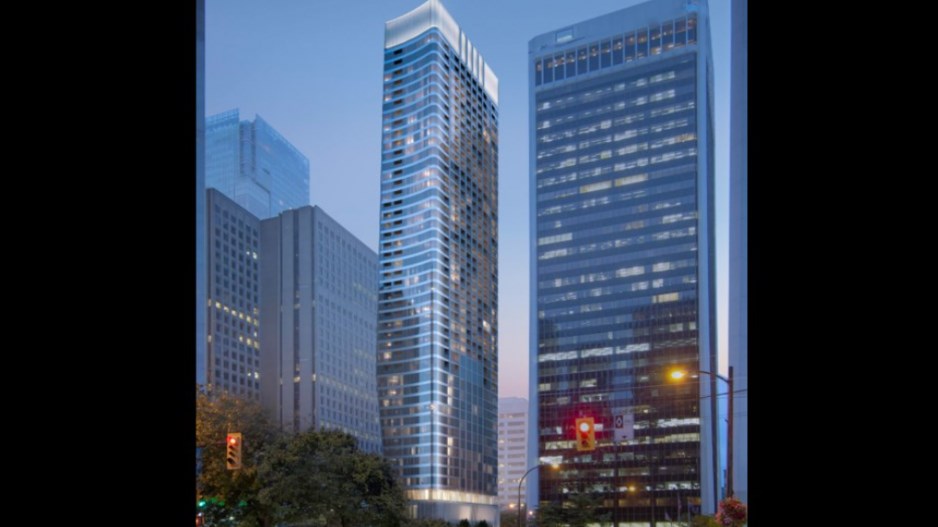The City of Vancouver’s director of planning has recommended staff do not support a rezoning application for a 46-storey residential rental tower next to the landmark MacMillan Bloedel office tower in the central business district (CBD), though one-in-five of the rentals would be offered at below-market rents.
Council will consider the proposal tonight (July 5) at a meeting.
“Residential uses are not permitted in this area under the DODP [downtown official development plan],” stated Theresa O'Donnell, the city’s general manager of planning, urban design and sustainability, in the June 21 resolution.
The resolution does not stop developer Reliance Properties from proceeding with the application for 1075 West Georgia Street, but it would likely be futile, O’Donnnell suggests.
Since 2009, Vancouver has restricted residential development in the CBD in order to provide commercial space in the core. “The reintroduction of residential uses in this key commercial hub would risk destabilizing land values in the area and make commercial development less viable, “O’Donnell noted.
The proposal is for a 46-storey mixed-use building containing commercial-retail uses at grade, one floor of office space and 484 secured rental residential units above. Reliance said 20 per cent of the rentals would be “workforce housing” for households with an income range of $56,000 to $120,000 per year.
A density of 16.18 FSR (floor space ratio) is proposed for the site, which is adjacent to the heritage-designated office tower that was renamed Arthur Erickson Place last year.
'There is a serious shortage of rental homes in the city, with many projects trapped in bureaucratic red tape for more than 10 years, and workforce housing is non-existent,” said Jon Stovell, president and CEO of Reliance Properties. “If the City of Vancouver wants to solve the housing crisis, then it needs to make bold decisions.”
The workforce housing would be geared to paramedics, nurses, firefighters, grocery clerks, restaurant staff, and construction workers, he said.
Current city policy defines below-market rentals as targeting those with an annual income between $30,000 and $80,000, with rents geared to a maximum of 30 per cent of pre-tax household income.
The city noted that Reliance proposes higher targeted rents at project opening, no limit on household incomes for eligibility, no cap on rent escalation at turnover, and no studio units among the tower’s 104 below-market rentals.
“As a result, staff do not consider the “workforce housing” a substantial public benefit under the City’s current polices or programs,” O’Donnell stated.
The proposal does have support from some frontline workers, including the president of the Ambulance Paramedics of B.C.
“I support workforce housing in downtown Vancouver and respectfully implore City Council to do the same at Tuesday’s [July 5] council meeting.,” said Troy Clifford. “It is critical for paramedics, emergency responders and frontline workers to live in the communities in which they serve, especially if there is a natural disaster like an earthquake which requires immediate and coordinated emergency response."
Clifford adds that B.C. has an ambulance-paramedic staffing shortage directly related to cost-of-living and affordability. “Workforce housing is a more attainable form of housing and could help recruit and retain paramedics in Vancouver,” he said.




